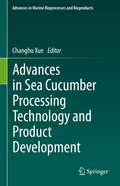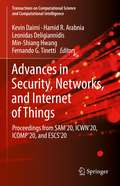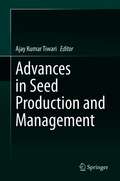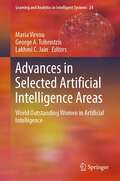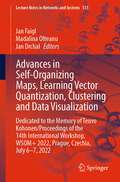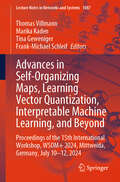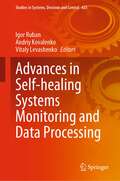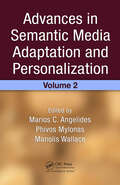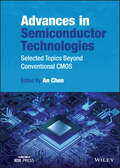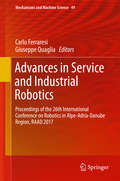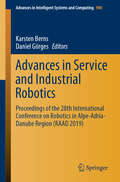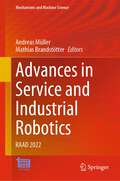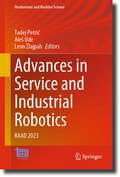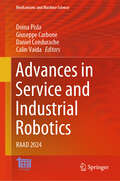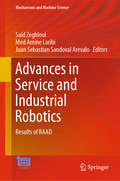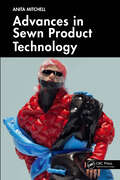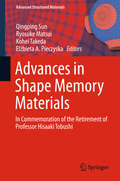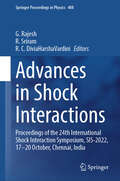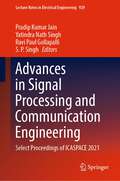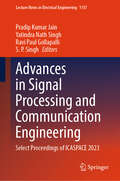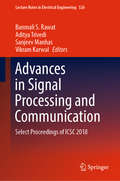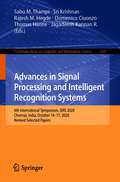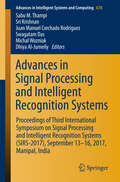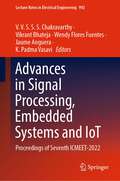- Table View
- List View
Advances in Sea Cucumber Processing Technology and Product Development (Advances in Marine Bioprocesses and Bioproducts)
by Changhu XueSea cucumbers belong to the Phylum Echinodermata. There are more than 900 recorded species of sea cucumber of which more than 40 are edible. As a food source, sea cucumbers are rich in protein, low in fat, rich in collagen, sulfated polysaccharides, phospholipids, glycolipids, saponins and other functional components. Therefore, sea cucumbers have important nutritional and medicinal value. Growing awareness of these health benefits has promoted growth in marine aquaculture and processing technologies for the development of sea cucumber products for many applications.Novel perspectives of nutritional functions and processing technologies of sea cucumbers are defined in this book. The chemical structure and nutritional function of sea cucumbers are systematically reviewed. These include the functional/nutritional components, the endogenous enzymatic properties related to processing efficiency and product quality, and the efficient preparation technology of functional components. The traditional processing technology is presented as the background context to highlight the advances in new processing technologies including low-temperature cooking technology based on controllable negative pressure system, heat pump-hot-blast air combined drying technology, microwave sterilization of instant sea cucumber, collagen stabilization technology. The book finishes with the authentication of sea cucumber types and origin, quality standards, product quality control systems and food safety requirements.
Advances in Security, Networks, and Internet of Things: Proceedings from SAM'20, ICWN'20, ICOMP'20, and ESCS'20 (Transactions on Computational Science and Computational Intelligence)
by Hamid R. Arabnia Kevin Daimi Leonidas Deligiannidis Min-Shiang Hwang Fernando G. TinettiThe book presents the proceedings of four conferences: The 19th International Conference on Security & Management (SAM'20), The 19th International Conference on Wireless Networks (ICWN'20), The 21st International Conference on Internet Computing & Internet of Things (ICOMP'20), and The 18th International Conference on Embedded Systems, Cyber-physical Systems (ESCS'20). The conferences took place in Las Vegas, NV, USA, July 27-30, 2020. The conferences are part of the larger 2020 World Congress in Computer Science, Computer Engineering, & Applied Computing (CSCE'20), which features 20 major tracks. Authors include academics, researchers, professionals, and students. Presents the proceedings of four conferences as part of the 2020 World Congress in Computer Science, Computer Engineering, & Applied Computing (CSCE'20);Includes the tracks on security & management, wireless networks, internet computing and IoT, and embedded systems as well as cyber-physical systems;Features papers from SAM’20, ICWN’20, ICOMP’20 and ESCS’20.
Advances in Seed Production and Management
by Ajay Kumar TiwariHigh-quality seed is essential for healthy crops and greater agricultural productivity. At the same time, advances in breeding technology require equivalent advances in seed technology. In order to ensure food security, it is crucial to develop seeds that are high yielding, and resistant to drought, heat, cold, and insects. Gathering the latest research in seed sciences, the book includes contributions on seed production in crops such as legumes, sugar, rice, wheat and other cereals. It discusses a range of topics, like the effect of climate change on seed quality, production and storage; seed rouging; seed certification for different crop species; seed biology; and seed pathologies and their effective management. Integrating basic and applied research, this compendium provides valuable insights for researchers and students in agricultural and life sciences; professionals involved in seed certification and those working in quarantine laboratories; as well as plant pathologists.
Advances in Selected Artificial Intelligence Areas: World Outstanding Women in Artificial Intelligence (Learning and Analytics in Intelligent Systems #24)
by Lakhmi C. Jain Maria Virvou George A. TsihrintzisAs new technological challenges are perpetually arising, Artificial Intelligence research interests are focusing on the incorporation of improvement abilities into machines in an effort to make them more efficient and more useful. Recent reports indicate that the demand for scientists with Artificial Intelligence skills significantly exceeds the market availability and that this shortage will intensify further in the years to come. A potential solution includes attracting more women into the field, as women currently make up only 26 percent of Artificial Intelligence positions in the workforce. The present book serves a dual purpose: On one hand, it sheds light on the very significant research led by women in areas of Artificial Intelligence, in hopes of inspiring other women to follow studies in the area and get involved in related research. On the other hand, it highlights the state-of-the-art and current research in selected Artificial Intelligence areas and applications. The book consists of an editorial note and an additional thirteen (13) chapters, all authored by invited women-researchers who work on various Artificial Intelligence areas and stand out for their significant research contributions. In more detail, the chapters in the book are organized into three parts, namely (i) Advances in Artificial Intelligence Paradigms, (ii) Advances in Artificial Intelligence Applications, and (iii) Recent Trends in Artificial Intelligence Areas and Applications. This research book is directed towards professors, researchers, scientists, engineers and students in Artificial Intelligence-related disciplines. It is also directed towards readers who come from other disciplines and are interested in becoming versed in some of the most recent Artificial Intelligence-based technologies. An extensive list of bibliographic references at the end of each chapter guides the readers to probe further into the Artificial Intelligence areas of interest to them.
Advances in Self-Organizing Maps, Learning Vector Quantization, Clustering and Data Visualization: Dedicated to the Memory of Teuvo Kohonen / Proceedings of the 14th International Workshop, WSOM+ 2022, Prague, Czechia, July 6-7, 2022 (Lecture Notes in Networks and Systems #533)
by Jan Faigl Madalina Olteanu Jan DrchalIn this collection, the reader can find recent advancements in self-organizing maps (SOMs) and learning vector quantization (LVQ), including progressive ideas on exploiting features of parallel computing. The collection is balanced in presenting novel theoretical contributions with applied results in traditional fields of SOMs, such as visualization problems and data analysis. Besides, the collection further includes less traditional deployments in trajectory clustering and recent results on exploiting quantum computation. The presented book is worth interest to data analysis and machine learning researchers and practitioners, specifically those interested in being updated with current developments in unsupervised learning, data visualization, and self-organization.
Advances in Self-Organizing Maps, Learning Vector Quantization, Interpretable Machine Learning, and Beyond: Proceedings of the 15th International Workshop, WSOM+ 2024, Mittweida, Germany, July 10–12, 2024 (Lecture Notes in Networks and Systems #1087)
by Thomas Villmann Frank-Michael Schleif Marika Kaden Tina GewenigerThe book presents the peer-reviewed contributions of the 15th International Workshop on Self-Organizing Maps, Learning Vector Quantization and Beyond (WSOM$+$ 2024), held at the University of Applied Sciences Mittweida (UAS Mitt\-weida), Germany, on July 10–12, 2024. The book highlights new developments in the field of interpretable and explainable machine learning for classification tasks, data compression and visualization. Thereby, the main focus is on prototype-based methods with inherent interpretability, computational sparseness and robustness making them as favorite methods for advanced machine learning tasks in a wide variety of applications ranging from biomedicine, space science, engineering to economics and social sciences, for example. The flexibility and simplicity of those approaches also allow the integration of modern aspects such as deep architectures, probabilistic methods and reasoning as well as relevance learning. The book reflects both new theoretical aspects in this research area and interesting application cases. Thus, this book is recommended for researchers and practitioners in data analytics and machine learning, especially those who are interested in the latest developments in interpretable and robust unsupervised learning, data visualization, classification and self-organization.
Advances in Self-healing Systems Monitoring and Data Processing (Studies in Systems, Decision and Control #425)
by Igor Ruban Vitaly Levashenko Andriy KovalenkoThis book presents the systematized research, development and improvement of methods in self-healing communication and control systems. The book presents new models and methods of data processing, focused on the specifics of self-healing systems. The goal is to equip the reader with the necessary knowledge about trends in monitoring and detecting failures, modelling processes and methods of data processing in self-healing communication and control systems.
Advances in Semantic Media Adaptation and Personalization, Volume 2
by Marios C. Angelides Manolis Wallace Phivos MylonasThe emergence of content- and context-aware search engines, which not only personalize searching and delivery but also the content, has caused the emergence of new infrastructures capable of end-to-end ubiquitous transmission of personalized multimedia content to any device on any network at any time. Personalizing and adapting content requires pro
Advances in Semiconductor Technologies: Selected Topics Beyond Conventional CMOS
by An ChenAdvances in Semiconductor Technologies Discover the broad sweep of semiconductor technologies in this uniquely curated resource Semiconductor technologies and innovations have been the backbone of numerous different fields: electronics, online commerce, the information and communication industry, and the defense industry. For over fifty years, silicon technology and CMOS scaling have been the central focus and primary driver of innovation in the semiconductor industry. Traditional CMOS scaling has approached some fundamental limits, and as a result, the pace of scientific research and discovery for novel semiconductor technologies is increasing with a focus on novel materials, devices, designs, architectures, and computer paradigms. In particular, new computing paradigms and systems—such as quantum computing, artificial intelligence, and Internet of Things—have the potential to unlock unprecedented power and application space. Advances in Semiconductor Technologies provides a comprehensive overview of selected semiconductor technologies and the most up-to-date research topics, looking in particular at mainstream developments in current industry research and development, from emerging materials and devices, to new computing paradigms and applications. This full-coverage volume gives the reader valuable insights into state-of-the-art advances currently being fabricated, a wide range of novel applications currently under investigation, and a glance into the future with emerging technologies in development. Advances in Semiconductor Technologies readers will also find: A comprehensive approach that ensures a thorough understanding of state-of-the-art technologies currently being fabricated Treatments on all aspects of semiconductor technologies, including materials, devices, manufacturing, modeling, design, architecture, and applications Articles written by an impressive team of international academics and industry insiders that provide unique insights into a wide range of topics Advances in Semiconductor Technologies is a useful, time-saving reference for electrical engineers working in industry and research, who are looking to stay abreast of rapidly advancing developments in semiconductor electronics, as well as academics in the field and government policy advisors.
Advances in Service and Industrial Robotics: Proceedings of the 26th International Conference on Robotics in Alpe-Adria-Danube Region, RAAD 2017 (Mechanisms and Machine Science #49)
by Carlo Ferraresi Giuseppe QuagliaThis volume contains the proceedings of the 26th International Conference on Robotics in Alpe-Adria-Danube Region, RAAD 2017, held at the Polytechnic University of Turin, Italy, from June 21-23, 2017. The conference brought together academic and industrial researchers in robotics from 26 countries, the majority of them affiliated to the Alpe-Adria-Danube Region, and their worldwide partners. RAAD 2017 covered all major areas of R&D and innovation in robotics, including the latest research trends. The book provides an overview on the advances in service and industrial robotics. The topics are presented in a sequence starting from the classical robotic subjects, such as kinematics, dynamics, structures, control, and ending with the newest topics, like human-robot interaction and biomedical applications. Researchers involved in the robotic field will find this an extraordinary and up-to-date perspective on the state of the art in this area.
Advances in Service and Industrial Robotics: Proceedings of the 28th International Conference on Robotics in Alpe-Adria-Danube Region (RAAD 2019) (Advances in Intelligent Systems and Computing #980)
by Karsten Berns Daniel GörgesThis book presents the proceedings of the 28th International Conference on Robotics in Alpe-Adria-Danube Region, RAAD 2019, held at the Fraunhofer Zentrum and the Technische Universität in Kaiserslautern, Germany, on 19–21 June 2019. The conference brought together academic researchers in robotics from 20 countries, mainly affiliated to the Alpe-Adria-Danube Region and covered all major areas of robotic research, development and innovation as well as new applications and current trends. Offering a comprehensive overview of the ongoing research in the field of robotics, the book is a source of information and inspiration for researchers wanting to improve their work and gather new ideas for future developments. It also provides researchers with an innovative and up-to-date perspective on the state of the art in this area.
Advances in Service and Industrial Robotics: RAAD 2021 (Mechanisms and Machine Science #102)
by Saïd Zeghloul Med Amine Laribi Juan SandovalThis book presents the proceedings of the 30th International Conference on Robotics in Alpe-Adria-Danube Region, RAAD 2021, held in Poitiers, France, 21–23 June 2021. It gathers contributions by researchers from several countries on all major areas of robotic research, development and innovation, as well as new applications and current trends. The topics covered include: novel designs and applications of robotic systems, intelligent cooperating and service robots, advanced robot control, human-robot interfaces, robot vision systems, mobile robots, humanoid and walking robots, bio-inspired and swarm robotic systems, aerial, underwater and spatial robots, robots for ambient assisted living, medical robots and bionic prostheses, cognitive robots, cloud robotics, ethical and social issues in robotics, etc. Given its scope, the book offers a source of information and inspiration for researchers seeking to improve their work and gather new ideas for future developments.
Advances in Service and Industrial Robotics: RAAD 2022 (Mechanisms and Machine Science #120)
by Andreas Müller Mathias BrandstötterThis book presents the proceedings of the 31st International Conference on Robotics in Alpe-Adria-Danube Region (RAAD), held in Klagenfurt, Austria, June 8-10, 2022. It gathers contributions by researchers from several countries on all major areas of robotic research, development and innovation, as well as new applications and current trends. The topics covered include: novel designs and applications of robotic systems, intelligent cooperating and service robots, advanced robot control, human-robot interfaces, robot vision systems, mobile robots, humanoid and walking robots, bio-inspired and swarm robotic systems, aerial, underwater and spatial robots, robots for ambient assisted living, medical robots and bionic prostheses, cognitive robots, cloud robotics, ethical and social issues in robotics, etc. Given its scope, the book offers a source of information and inspiration for researchers seeking to improve their work and gather new ideas for future developments.
Advances in Service and Industrial Robotics: RAAD 2023 (Mechanisms and Machine Science #135)
by Aleš Ude Tadej Petrič Leon ŽlajpahThis book presents the proceedings of the 32nd International Conference on Robotics in Alpe-Adria-Danube Region (RAAD), held in Bled, Slovenia, June 14-16, 2023. It gathers contributions by researchers from several countries on all major areas of robotic research, development and innovation, as well as new applications and current trends. The topics covered include: novel designs and applications of robotic systems, intelligent cooperating and service robots, advanced robot control, human-robot interfaces, robot vision systems, mobile robots, humanoid and walking robots, bio-inspired and swarm robotic systems, aerial, underwater and spatial robots, robots for ambient assisted living, medical robots and bionic prostheses, cognitive robots, cloud robotics, ethical and social issues in robotics, etc. Given its scope, the book offers a source of information and inspiration for researchers seeking to improve their work and gather new ideas for future developments.
Advances in Service and Industrial Robotics: RAAD 2024 (Mechanisms and Machine Science #157)
by Giuseppe Carbone Doina Pisla Calin Vaida Daniel ConduracheThis book presents the Proceedings of the 33rd International Conference on Robotics in Alpe-Adria-Danube Region (RAAD), held in Cluj-Napoca, Romania, June 5–7, 2024. It gathers contributions by researchers from multiple countries on all major areas of robotic research, development, and innovation, as well as new applications and current trends. The topics include perception and learning, medical robotics and biomechanics, industrial robots and education, kinematics and dynamics, motion planning and control, service robotics and applications, mobile robots and innovative robot design, etc. Given its scope, the book offers a source of information and inspiration for researchers seeking to improve their work and gather new ideas for future developments.
Advances in Service and Industrial Robotics: Results of RAAD (Mechanisms and Machine Science #84)
by Saïd Zeghloul Med Amine Laribi Juan Sebastian Sandoval ArevaloThis book gathers contributions by researchers from several countries on all major areas of robotic research, development and innovation, as well as new applications and current trends. The topics covered include: novel designs and applications of robotic systems, intelligent cooperating and service robots, advanced robot control, human-robot interfaces, robot vision systems, mobile robots, humanoid and walking robots, bio-inspired and swarm robotic systems, aerial, underwater and spatial robots, robots for ambient assisted living, medical robots and bionic prostheses, cognitive robots, cloud robotics, ethical and social issues in robotics, etc. Given its scope, the book offers a source of information and inspiration for researchers seeking to improve their work and gather new ideas for future developments. The contents reflect the outcomes of the activities of RAAD (International Conference on Robotics in Alpe-Adria-Danube Region) in 2020.
Advances in Sewn Product Technology
by Anita MitchellThe fashion industry continues to contribute significantly to greenhouse gas emissions. It is one of the biggest polluters, one of the most wasteful of all global industries and is under increasing pressure to address unsustainable practice. Emerging out of the pandemic era the fashion industry is also responding to a variety of complex industry challenges such as high return rates, customer demand for better fitting apparel, faster fashion, the drive towards personalisation and greater transparency and sustainability across the value chain. These factors along with increasing labour costs are furthermore exerting force on the industry to embrace nearshoring and reshoring. Based on extensive primary research involving oral histories methodology with leading industry professionals involved in the innovation of technological and digital solutions for the fashion industry, this book presents the latest advances in sewn product technology which offer solutions to many of the fashion industry’s current and emerging challenges whilst also informing how these developments are influencing fashion jobs of today and tomorrow. This book is therefore of value to fashion students, academics, researchers, and technicians as well as those working within the fashion industry involved in the design, development, manufacture, buying and retail of fashion apparel.Features: Provides a comprehensive insight into the latest advances in sewing machine technology including advanced automation and robotics used in the manufacture of fashion apparel. Provides a comprehensive insight into the latest industrial sewing threads and needles that can effectively support sustainable design practice. Exclusively covers advances in digital technologies to support sustainable practice including advances in 3D body scanning and digital measuring systems, recent advances in digital pattern making and pattern design systems, recent advances in 3D fashion design software and the latest advances in Product Lifecycle Management (PLM) systems used within the fashion industry. Includes sections on advances in No-Sew Seam Bonding and ultrasonic welding technologies. Provides an insight into advancements in 3D cloth simulation and prototyping for apparel design and gaming. Enables readers to understand the impact of the latest advances in sewn product technology on the jobs of today and tomorrow. Case studies that provide working examples of advances in sewn product technology.
Advances in Shape Memory Materials: In Commemoration of the Retirement of Professor Hisaaki Tobushi (Advanced Structured Materials #73)
by Qingping Sun Ryosuke Matsui Kohei Takeda Elżbieta A. PieczyskaThis book is devoted to the development of the shape memory materials and their applications. It covers many aspects of smart materials. It also describes the method on how we can obtain not only large recovery strains but also high recovery stress, energy storage and energy dissipation in applications. This volume treats the mechanical properties of shape memory alloys, shape memory polymers and the constitutive equations of the materials which are necessary to design the shape memory elements in applications. It also deals with the fatigue properties of materials, the method to design the shape memory elements, and the shape memory composites. The authors are international experts on shape memory alloys and shape memory polymers in the metallurgical, chemical, mechanical and engineering fields. The book will be of interest to graduate students, engineers, scientists and designers who are working in the field of electric and mechanical engineering, industries, medical engineering, aerospace engineering, robots, automatic machines, clothes and recycling for research, design and manufacturing.
Advances in Shock Interactions: Proceedings of the 24th International Shock Interaction Symposium, SIS-2022, 17-20 October, Chennai, India (Springer Proceedings in Physics #408)
by G. Rajesh R. Sriram R. C. DiviaHarshaVardiniThis book is a collection of the technical papers presented in the 24th International Shock Interaction Symposium. The main topics include• Shock wave diffraction• Shock wave reflections and refraction on interfaces• Shock wave-boundary layer interaction• Shock wave-shear layer interaction• Shock wave-vortex interaction• Shock wave-bubble interaction• Shock wave-contact surface interaction• Shock wave diffraction over bodies or obstacles• Shock waves in rarefied flows• Shock waves in MHD flows• Dynamics of the explosion, blast waves, and detonations• Shock wave propagation in condensed and heterogeneous materials• Shock waves in high-enthalpy facilities• High-speed flow diagnostics
Advances in Signal Processing and Communication Engineering: Select Proceedings of ICASPACE 2021 (Lecture Notes in Electrical Engineering #929)
by S. P. Singh Pradip Kumar Jain Yatindra Nath Singh Ravi Paul GollapalliThis book comprises select proceedings of the International Conference on Advances in Signal Processing and Communication Engineering (ICASPACE 2021). The book covers several theoretical and mathematical approaches addressing day-to-day challenges in signal, image, and speech processing and advanced communication systems. It primarily focuses on effective mathematical methods, algorithms, and models that enhance the performance of existing systems. The topics covered in the book are advances in signal processing (radar and biomedical), image processing, speech processing, technical and environmental challenges in 5G technology, and strategies for optimal utilization of resources to improve the efficacy of the communication systems in terms of bandwidth and radiating power, etc. The works published in the book will remarkably be helpful to prospective scholars, academicians, and students seeking knowledge in signal processing and communication engineering.
Advances in Signal Processing and Communication Engineering: Select Proceedings of ICASPACE 2023 (Lecture Notes in Electrical Engineering #1157)
by S. P. Singh Pradip Kumar Jain Yatindra Nath Singh Ravi Paul GollapalliThis book comprises select proceedings of the International Conference on Advances in Signal Processing and Communication Engineering (ICASPACE 2023). The book covers several theoretical and mathematical approaches addressing day-to-day challenges in signal, image, and speech processing and advanced communication systems. It primarily focuses on effective mathematical methods, algorithms, and models that enhance the performance of existing systems. The topics covered in the book are advances in signal processing (radar and biomedical), image processing, speech processing, technical and environmental challenges in 5G technology, and strategies for optimal utilization of resources to improve the efficacy of the communication systems in terms of bandwidth and radiating power, etc. The works published in the book will remarkably be helpful to prospective scholars, academicians, and students seeking knowledge in signal processing and communication engineering.
Advances in Signal Processing and Communication: Select Proceedings of ICSC 2018 (Lecture Notes in Electrical Engineering #526)
by Banmali S. Rawat Aditya Trivedi Sanjeev Manhas Vikram KarwalThis book is a collection of selected peer-reviewed papers presented at the International Conference on Signal Processing and Communication (ICSC 2018). It covers current research and developments in the fields of communications, signal processing, VLSI circuits and systems, and embedded systems. The book offers in-depth discussions and analyses of latest problems across different sub-fields of signal processing and communications. The contents of this book will prove to be useful for students, researchers, and professionals working in electronics and electrical engineering, as well as other allied fields.
Advances in Signal Processing and Intelligent Recognition Systems: 6th International Symposium, SIRS 2020, Chennai, India, October 14–17, 2020, Revised Selected Papers (Communications in Computer and Information Science #1365)
by Thomas Hanne Sabu M. Thampi Sri Krishnan Domenico Ciuonzo Rajesh M. Hegde Jagadeesh Kannan R.This book constitutes the refereed proceedings of the 6th International Symposium on Advances in Signal Processing and Intelligent Recognition Systems, SIRS 2020, held in Chennai, India, in October 2020. Due to the COVID-19 pandemic the conference was held online. The 22 revised full papers and 5 revised short papers presented were carefully reviewed and selected from 50 submissions. The papers cover wide research fields including information retrieval, human-computer interaction (HCI), information extraction, speech recognition.
Advances in Signal Processing and Intelligent Recognition Systems: Proceedings of Third International Symposium on Signal Processing and Intelligent Recognition Systems (SIRS-2017), September 13-16, 2017, Manipal, India (Advances in Intelligent Systems and Computing #678)
by Swagatam Das Sabu M. Thampi Michal Wozniak Sri Krishnan Juan Manuel Corchado Rodriguez Dhiya Al-JumeilyThis edited volume contains a selection of refereed and revised papers originally presented at the International Symposium on Signal Processing and Intelligent Recognition Systems (SIRS-2014), March 13-15, 2014, Trivandrum, India. The program committee received 134 submissions from 11 countries. Each paper was peer reviewed by at least three or more independent referees of the program committee and the 52 papers were finally selected. The papers offer stimulating insights into Pattern Recognition, Machine Learning and Knowledge-Based Systems; Signal and Speech Processing; Image and Video Processing; Mobile Computing and Applications and Computer Vision. The book is directed to the researchers and scientists engaged in various field of signal processing and related areas.
Advances in Signal Processing, Embedded Systems and IoT: Proceedings of Seventh ICMEET- 2022 (Lecture Notes in Electrical Engineering #992)
by Vikrant Bhateja Jaume Anguera V. V. S. S. S. Chakravarthy Wendy Flores Fuentes K. Padma VasaviThe book discusses the latest developments and outlines future trends in the fields of microelectronics, electromagnetics and telecommunication. It contains original research works presented at the International Conference on Microelectronics, Electromagnetics and Telecommunication (ICMEET 2022), held in Bheemavaram, West Godavari (Dist), Andhra Pradesh, India during 22 – 23 July 2022. The papers were written by scientists, research scholars and practitioners from leading universities, engineering colleges and R&D institutes from all over the world, and share the latest breakthroughs in and promising solutions to the most important issues facing today’s society.
